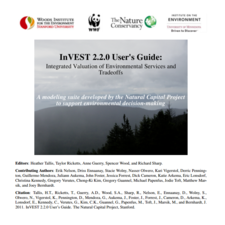Resources: Guides
-
An introduction to environmental assessment
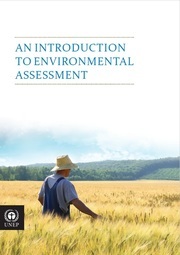
A practical reference resource brochure for all audiences concerned with decision and policy making in regard to the environment and sustainable development. This publication provides an introduction to environmental assessments in terms of why they might be needed, what key questions should be considered in the process of environmental assessment, assessment process and design, and presents information and resources on nice different groups of assessment methods.
Download -
Payments for Ecosystem Services: A best practice guide
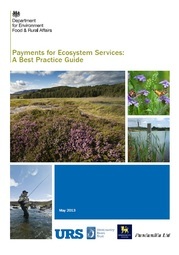
This best practice guide has been developed by an expert consortium with hands-on experience of developing Payments for Ecosystem Services (PES) schemes, in collaboration with potential users. An authoritative, practical and business-focussed guide, it collates a number of instructive domestic and international case studies demonstrating the various challenges associated with a PES approach. This guide will help users to: understand the principles of PES; identify and test potential opportunities and suitable partners for PES; and find solutions to technical, legal and institutional issues.
Download -
Eco4Biz - Ecosystem services and biodiversity tools to support business decision-making
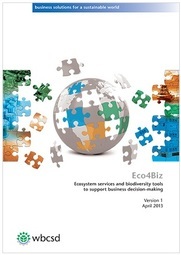 Developed by the World Business Council for Sustainable Development (WBCSD) Eco4Biz is a structured overview of existing tools and approaches, focusing on either ecosystem services (such as provisioning, regulating and cultural services), or biodiversity. Eco4Biz features a decision tree, composed of two questions corporate managers might ask themselves:
Developed by the World Business Council for Sustainable Development (WBCSD) Eco4Biz is a structured overview of existing tools and approaches, focusing on either ecosystem services (such as provisioning, regulating and cultural services), or biodiversity. Eco4Biz features a decision tree, composed of two questions corporate managers might ask themselves:- At what scale would you like to carry out an assessment, i.e. global, landscape (including individual site and portfolio of sites), or product level?
- What outputs would best support your decision-making, e.g. a map (including supporting reports), a quantitative value, or a score showing priority areas?
-
Measuring and managing corporate performance in an era of expanded disclosure: A review of the emerging domain of ecosystem services tools
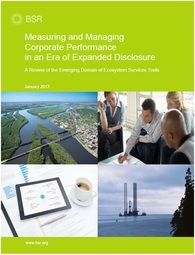
BSR has developed this report to assist business people who are asking questions about ecosystem services. The report offers a unique view of the full suite of current tools, highlights opportunities and challenges for their use in the private sector, and suggests ways forward for piloting, verifying and validating ecosystem services tools. This report is intended to help corporate decision-makers understand and assess the current state of play within the ecosystem services tool landscape.
Download -
Guide on Integrating Ecosystem Services into Development Planning: a stepwise approach for practitioners based on the TEEB approach
Download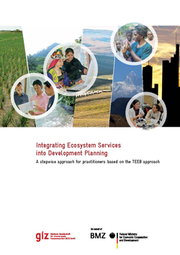 This guide aims to assist advisors, project staff and development planners in partner countries in recognising the links between nature and development. It considers the environmental and economic trade-offs associated with development measures and helps to systematically incorporate ecosystem service-related opportunities and risks into the planning and development of strategies. This step-by-step approach aims to support GIZ programmes and partners to integrate ecosystem services into the design and review of development plans, sector-specific and spatial planning.
This guide aims to assist advisors, project staff and development planners in partner countries in recognising the links between nature and development. It considers the environmental and economic trade-offs associated with development measures and helps to systematically incorporate ecosystem service-related opportunities and risks into the planning and development of strategies. This step-by-step approach aims to support GIZ programmes and partners to integrate ecosystem services into the design and review of development plans, sector-specific and spatial planning.
-
Measuring and Monitoring Ecosystem Services at the Site Scale (TESSA): Introducing a practical toolkit
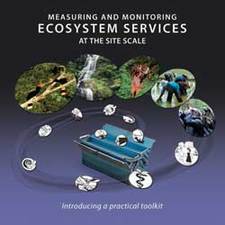
Developed by Birdlife International and a consortium of researchers and conservation biologists, this booklet introduces a new ‘toolkit’ for measuring ecosystem services at the site scale that is accessible to non-experts and delivers scientifically robust results. TESSA is primarily aimed at conservation practitioners, although the methods may be applicable to a wide range of users, including natural resource managers (e.g. forestry, fisheries, water managers), land-use planners, development organisations (e.g. for poverty alleviation), and the private sector. More information about the toolkit can be found here .
Download -
InVEST
Designed by the Natural Capital Project, InVEST (Integrated Valuation of Ecosystem Services & Tradeoffs) is a family of tools to map and value the goods and services from nature which are essential for sustaining and fulfilling human life. InVEST enables decision-makers to assess the trade-offs associated with alternative choices and to identify areas where investment in natural capital can enhance human development and conservation in terrestrial, freshwater, and marine ecosystems.
Download -
Guidance Manual for the Valuation of Regulating Services
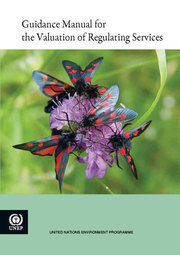
This manual aims to identify and evaluate different methodologies for valuing regulating services in economic term. Case studies demonstrate the application of methodologies to the valuation of regulating services and the scope for incorporating these values into decision-making processes.
Download
This manual is directed towards practitioners in environmental economics. Its primary use is expected to be as a supporting tool for estimating the economic value of regulating services provided by a particular ecosystem in a particular area and for a specified time period. -
Ecosystems and Human Well-being - A Manual for Assessment Practitioners
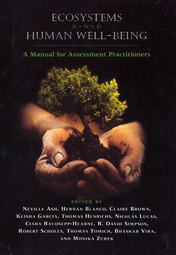
This manual is a stand-alone “how to” guide to conducting ecosystem assessments of the impacts of ecosystem change to human well-being. It builds on the experiences and lessons learned from the Millennium Ecosystem Assessment. The manual is aimed at assessment practitioners who are looking for guidance on particular aspects of the assessment process, including tools and approaches to assess options for better management of ecosystems.
Download -
Ecosystem Services: A guide for decision makers
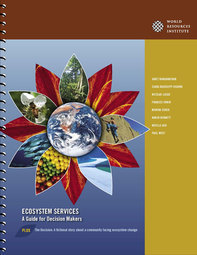
This guide, published by the World Resources Institute and partners, aims to outline how an Ecosystems Services Approach can be incorporated into existing decision making processes to strengthen development strategies. It builds on existing experience with multiple-use ecosystem management, ecosystem restoration, and conservation planning, but identifies ecosystem services more explicitly. This guide is intended for decision makers (i.e. a city mayor; a local planning commission member; a provincial governor; an international development agency official; or a national minister of finance, energy, water, or environment).
Download
